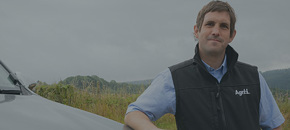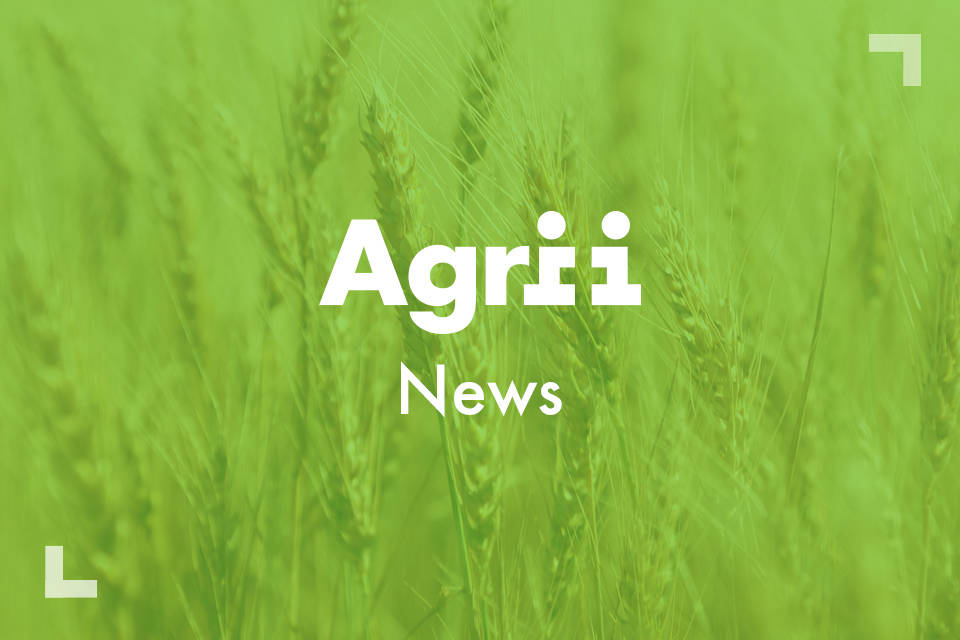
Establishing a legacy of excellence at The Wiston Estate Vineyard.
News - 09.07.21
The Wiston Estate has enjoyed considerable success in recent years. Vineyard magazine spoke to one of the founders to hear how it has achieved so much in such a short time.
Time is often a luxury that few can afford but for anyone contemplating viticulture as a business opportunity, it is the one requirement that dominates all others. Fortunately for Richard Goring, manager at the Wiston Estate near Worthing in West Sussex, his family has an established track record of thinking for the long term.
Having farmed the estate since 1743, the Goring family understands that decisions taken today will have consequences that endure far beyond tomorrow. An appreciation for future generations is, however, just as much of a reason to constantly evolve as it is to resist anything that might spoil either the landscape or jeopardise future opportunities, regardless of the short-term returns that some activities may bring.
Over the centuries, Wiston has been through several evolutions of its own. Until the outbreak of the second world war, it was like many of the farms in the region, a typical lowland livestock farm with sheep and cattle. In the aftermath of the war, however, when successive governments encouraged activities that would improve self-sufficiency in basic food staples, it became a mixed enterprise comprising rotational arable crops, such as wheat and barley, a 120-cow dairy unit, a herd of suckler beef and a flock of sheep.
The era of maximum inputs for maximum output that characterised the post-war years, however, is over and low-impact farming that promotes the environment is the focus of the day. Today, Wiston is a decade-and-a-half into a new evolution. Faced with a dairy unit running at an unsustainable loss, the growing interest of French champagne houses in the south of England served as the catalyst for the diversification into vines.
“My South African mother recognised that the soil and topography of the land was well-suited to vines and had for a long time promoted vines as a commercial idea. Some 30 years later when the French producers began to show an interest, my father began to take her seriously,” Richard remarks of the early years.
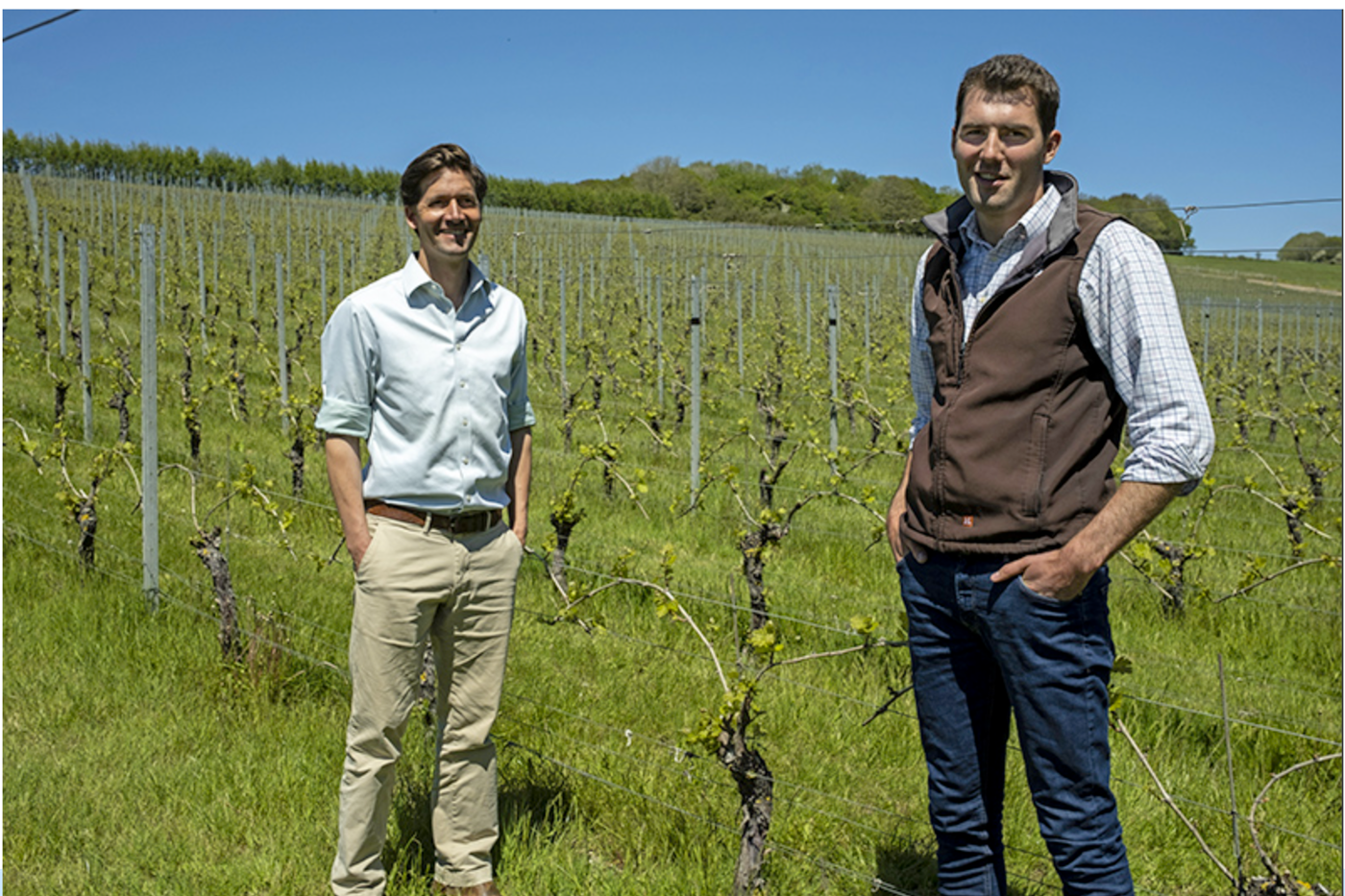
In 2005 the family decided to divest of its dairy interests and the following year the herd was sold. The capital it provided funded roughly 6.5 hectares (16 acres) of vines comprising the ‘big three’ grapes of pinot noir, chardonnay, and Pinot Meunier.
“It was a risky decision to take but we did our homework and took confidence from the intent being shown in the region by the big French champagne brands. Mum was ecstatic and her commitment has since helped drive our success. Without mum’s enthusiasm and determination to make this a triumph, it is unlikely that we would have attracted the winemaker we have,” Richard says.
The choice of vines was also significant. The Germanic types that were once popular have been succeeded by more palate-friendly varieties from France. These varieties are more familiar to consumers and tend to produce wines that are enjoyed around the world.
In 2006, having planted the first grapes, the family were approached by Dermot Sugrue, the resident winemaker at Nyetimber, who subsequently joined the Wiston business and established the estate’s own winery.
“Dermot is a brilliant winemaker, and we recognised the opportunity this presented to utilise the plant and equipment to contract process grapes for other growers in the area. We now process 100 tonnes of grapes annually for ourselves and roughly 450 tonnes for other growers,” Richard says.
The arrangement with clients differs from the model of the French grower co-operatives where the grapes are mixed, and the members receive an allocation of the wine produced. To preserve the integrity of each grower working with Wiston, the grapes are pressed separately,
In 2017 a further 5.6 hectares (14 acres) were planted as interest in the Wiston wines stimulated demand.
“Prosecco has made sparkling wine accessible to society and now we are seeing people trade up to the premium wines. While the UK market is still growing, there are also significant overseas markets such as Scandinavia and Japan that should not be overlooked,” stresses Richard.
The success of Wiston wines has understandably led to some introductions that would otherwise be beyond most small producers.
“I was fortunate to have a meeting with the CEO and owner of probably the world’s best-known champagne house Louis Roederer – producer of cuvée, Cristal – who gave me some excellent advice. ‘Grow small plots of vines across the estate and learn which terroirs produce the best wine and then expand outwards. You will learn over a 10-year period which vineyards produce the best wine.’ It was reassuring to be told to grow slowly and not rush into it.”
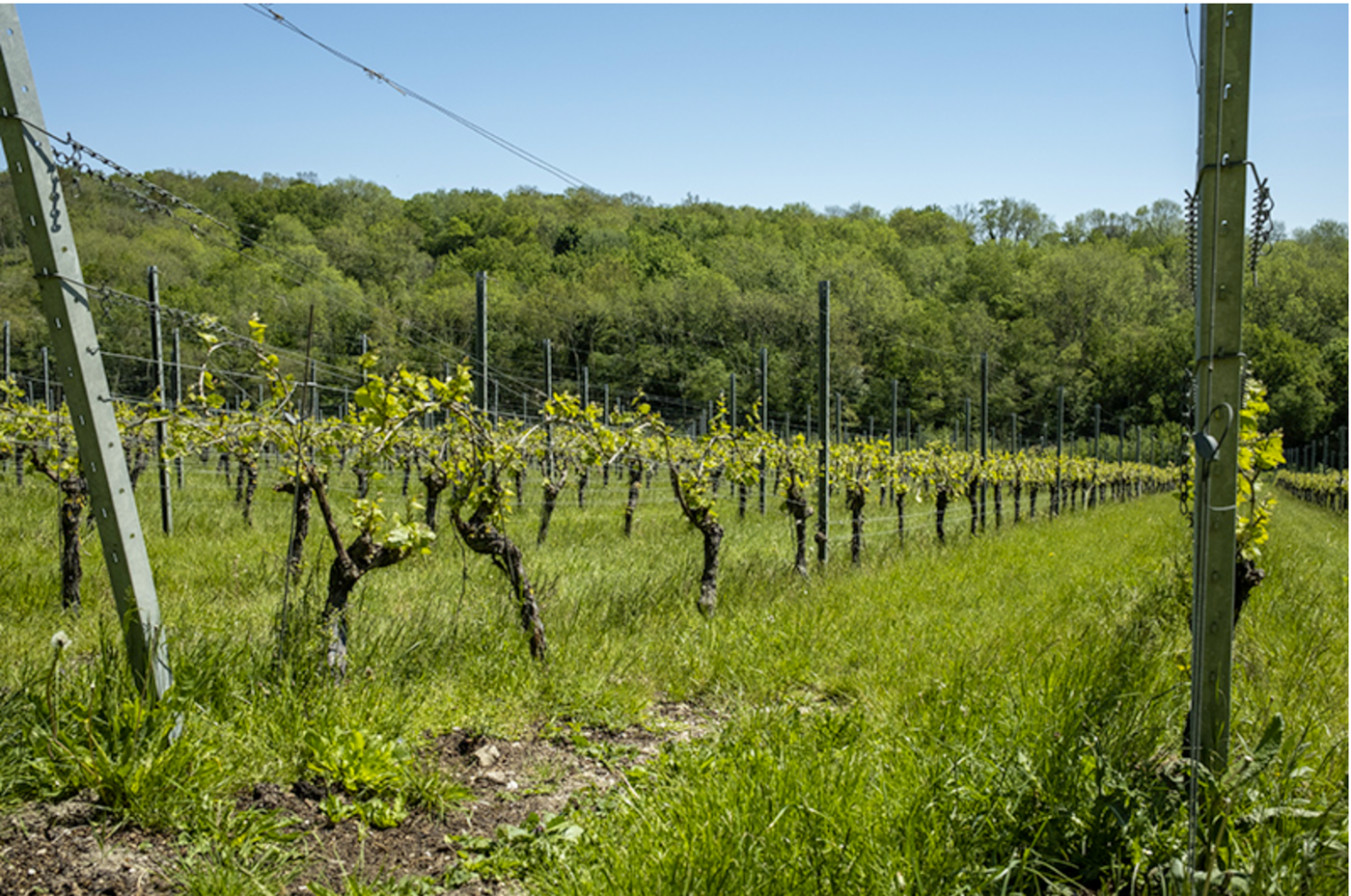
This philosophy supports the ambition to develop the business by working with other growers.
“We are farmers, not a hedge fund, so the expectations are different because we don’t have the cash to grow quickly. The market for English sparkling wine is still expanding and even at 30 acres, we are only a medium-size vineyard (for England). By working with others, we can continue to grow without over-exerting ourselves financially while supporting others with a diversification.”
Wiston Estate sold its first bottle of sparkling wine in 2012, but it was not until 2014 when demand began to take off. With eight years from production to sale, there is significant cash invested in stock, hence the desire to collaborate with others.
“The business case is long-term, even generational and the risk is undoubtedly higher than with commodity crops – in 2012 we didn’t harvest a grape due to the wet weather – and without the operating profit of the farm, we could not have funded this diversification. But the prospect of trying to compete with other commodity-producing countries without the safety net provided by the government convinces me that this has to be a worthwhile and necessary enterprise.”
Richard is at pains to dismiss any suggestion that vines are a short path to great riches, hence his repeated assertion that the business case is long term, but there are other rewards.
In 2019, the Wiston Estate Blanc de Blancs 2011 – a 100% chardonnay sparkling wine – won the ‘best in show’ at the Decanter World Wine Awards making it only the second English sparkling wine to have won the award along with Chapel Down.
It was the third time in six years that a Wiston made wine had won a top award at the Decanter World Wine Awards and marks a remarkable achievement for Wiston and its winemaker Dermot Sugrue.
“It’s reassuring to know that we can produce some truly world-class wines and is an endorsement of the commitment that my family and our staff have shown since we embarked on this journey in 2006,” says Richard.
The success has continued with the ‘Wiston Estate 2015 Blanc de Blancs’ winning the trophy for best sparkling wine made in the traditional method in the Blanc de Blancs class at this year’s WineGB awards.
Expert Advice from Agrii
The economics of grape production are a world away from most crops, but a long growing season and average temperatures close to that of Champagne 20 years ago, ensure that the south coast of England has a bright future as a region for sparkling wine. A warming climate means there are opportunities for those further north, but as with all new ventures, the devil is in the detail. Fortunately, there are many good sources of advice available for those contemplating a vineyard.
One of those which has provided advice and guidance to Wiston since its foundations is Agrii, the agronomy and strategic advisers to agriculture, and in particular its viticulture specialist, Ben Brown who had worked with the estate to develop a sustainable approach to grape production.
“The first step should be to source some objective advice about the suitability of the intended site and identify the appropriate root stock and scion clones. Sparkling wine may dominate production in the south-east, but there is a preference for Bacchus amongst other varieties for premium still wines.
It is often overlooked but selecting the rootstock that best suits the site is paramount to creating a vineyard with longevity. Chalky sites tend to have higher active calcium which suits lime tolerant root stocks such as Fercal or 41-B while on more clay-rich sites, SO4 (Sélection Oppenheim 4) may be preferable. Time invested in digging soil pits and soil scanning is often critical to understanding the soil strata and texture to maximise vine longevity,” says Ben.
Site suitability involves several factors with free-draining soils and a favourable mean air temperature essential. Field aspect is also important, but less so than soil type and overall air temperature.
“Good data is essential to site assessment, especially for temperatures. It is often worthwhile placing a thermometer at a site to collect daily temperatures, preferably across two calendar years to establish the frost risk. This will help to determine variety choice, for example Pinot Noir is less susceptible to frost damage as it is later to come into bud. There are also some useful geographic information system (GIS) maps available with long-term data on frosts and other weather-related threats that will help to guide site selection,” says Ben.
Another question to be resolved in the early stages is ‘what’s your intended market?’. “This is a specialist crop, not a commodity such as wheat or barley. You can’t just expect to sell it to any old merchant,” he says.
Having found a site, identified the most appropriate root stock and scion combination, and a buyer, the rootstock should be ordered but do not expect next-day delivery.
“There can be a two-year lead time for less common rootstock combinations. Roughly 1-1.5 million vines have been planted in England for the past four years and the market is still growing,” says Ben.
There is also considerable investment. In a good year Wiston Estate would hope to harvest about 9.25 tonnes of grapes per hectare (3.75 t/acre) which at roughly £2000 tonne can seem an attractive return. There are also years when the yield will be a lot lower and, in the case of 2012, sometimes nothing.
“The capital investment would be £25-30,000/hectare which would cover vines, trellis and wires. To this you can add equipment and the labour costs of pruning, wire work, harvesting and site maintenance,” says Ben.
Good pest and disease control are essential to harvesting a clean and ripe crop. Diseases such as downy mildew, powdery mildew and botrytis are controlled with fungicides while moths and the vinegar fruit fly, spotted wing drosophila (Drosophila suzukii) will require the occasional targeted insecticide.
“In addition, there will be weed control to consider. This is often a combination of glyphosate under the vines or a specialist inter-row cultivator. Each approach has its advantages and disadvantages, but most growers would opt for a combination of the two according to the time of the season and the weed burden to be controlled,” says Richard.
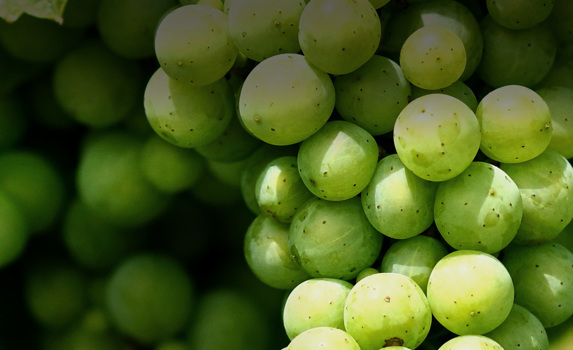
Vineyard Services
Vine FruitBright future
Data gathered by Wines of Great Britain, the national body for grape growers and winemakers, charts the growth of the sector over the past 10 years and offers a forecast of future growth.
“There are currently around 2,500 ha (6,200 acres) of vineyards in the UK and this has increased by over 140% in the last 10 years. There are about 700 vineyards (about 540 are commercial) and around 160 wineries, producing an average of around 5 million bottles a year (5.9m in 2017). The styles produced are: 66% sparkling, 24% still white and 10% red rose,” notes WinesGB.
A combination of a more favourable climate and the increasing success of English wines in international competitions along with investment in vineyards and greater education and training for those working in the sector, promote a favourable assessment of the future for English wine.
Research published in 2018 suggested that roughly 35,000 hectares (86,450 acres) of land across the UK was suitable for growing grapes. At the time, roughly 2,500 hectares across England and Wales was planted with vines.
The report, which used geographical analysis to assess 50x50 metre plots, concluded that the best land was to be found in Kent, Sussex and East Anglia. Alistair Nesbitt of Climate Wine Consulting and one of the three contributing authors of the paper published in Journal of Land Use Science, said the findings demonstrated that the vineyards outside the south-east had a bright future.
“Some of the best areas that we found are where relatively few vineyards currently exist, such as in Essex and Suffolk – parts of the country that are drier, warmer and more stable year-to-year than some more established vineyard locations.
“The techniques we used enabled us to identify areas ripe for future vineyard investments, but they also showed that many existing vineyards are not that well located, so there is definitely room for improvement, and we hope our model can help boost future productivity,” said Dr Nesbitt.
The best English wines, be they still or sparkling, have transformed opinions of English wine. What was once considered laughable is now a source of pride and serious achievement. With continued investment and an attitude that aspires to perfection, the future is bright and one of which we can all be proud.
• Wiston Estate sparkling wines are exported to most developed countries, are served in many high-end restaurants and can be bought online at wistonestate.com
Join Our Community

Agrii X
We love engaging with clients and partners. Give us a follow and let's share stories for the community.

Agrii Instagram
A picture paints a thousand words. Follow us on Instagram to see what we are up to.

Agrii Facebook
Follow us on the worlds biggest social media site for the latest news and events straight to your feed.

Agrii LinkedIn
If you are all about the business, connect with us on LinkedIn to build your network
Stay In Touch

Journal Sign-Up
Receive email updates on topical news and information from around Agrii and UK Farming.

Listen To Our Podcasts
Listen to the Tramlines Podcast. Fortnightly chat about agriculture and trials with your host Tony Smith.

Agrii Insights
Read essential agri intelligence for profitable farming.

Find an Event
Join us for our upcoming events and tours.

